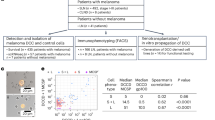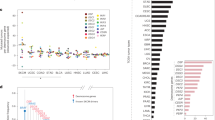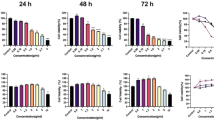Abstract
CD63, which belongs to the tetraspanin membrane proteins, has been proposed to play an important role in inhibiting melanoma metastasis. To determine whether reduction of CD63 expression, which frequently occurs in the malignant progression of human melanoma, is responsible for metastasis promotion, we transfected the antisense CD63 cDNA into MelJuso melanoma cells having endogenous CD63 expression. The antisense CD63 transfectant clones showing decreased CD63 expression displayed increased cell motility, matrix-degrading activity, and invasiveness in vitro when compared with the control transfectant cells. The antisense CD63 cDNA-transfected cells also exhibited altered adhesiveness to extracellular matrix. The results suggest that reduced CD63 expression contributes to the invasive and metastatic ability of human melanoma cells.
Similar content being viewed by others
Article PDF
Author information
Authors and Affiliations
Rights and permissions
This is an Open Access article distributed under the terms of the Creative Commons Attribution Non-Commercial License (http://creativecommons.org/licenses/by-nc/3.0/) which permits unrestricted non-commercial use, distribution, and reproduction in any medium, provided the original work is properly cited.
About this article
Cite this article
Jang, HI., Lee, H. A decrease in the expression of CD63 tetraspanin protein elevates invasive potential of human melanoma cells. Exp Mol Med 35, 317–323 (2003). https://doi.org/10.1038/emm.2003.43
Published:
Issue date:
DOI: https://doi.org/10.1038/emm.2003.43
Keywords
This article is cited by
-
A potential target gene CD63 for different degrees of intervertebral disc degeneration
Scientific Reports (2022)
-
Exosomes and cancer: from molecular mechanisms to clinical applications
Medical Oncology (2021)
-
CD63 Tetraspanin Is a Negative Driver of Epithelial-to-Mesenchymal Transition in Human Melanoma Cells
Journal of Investigative Dermatology (2014)
-
Timp1 interacts with beta-1 integrin and CD63 along melanoma genesis and confers anoikis resistance by activating PI3-K signaling pathway independently of Akt phosphorylation
Molecular Cancer (2013)
-
Tetraspanins and tumor progression
Clinical & Experimental Metastasis (2011)



